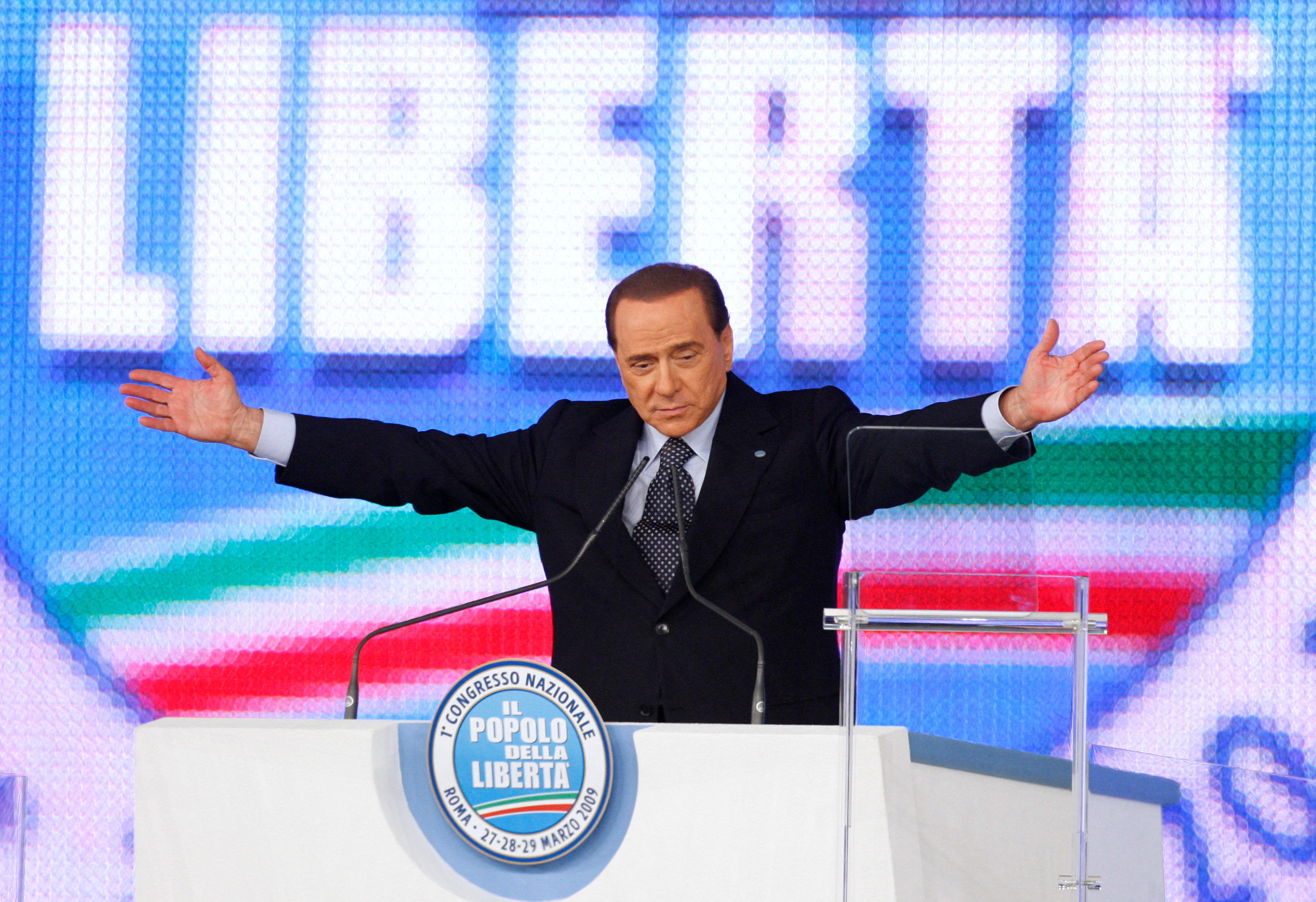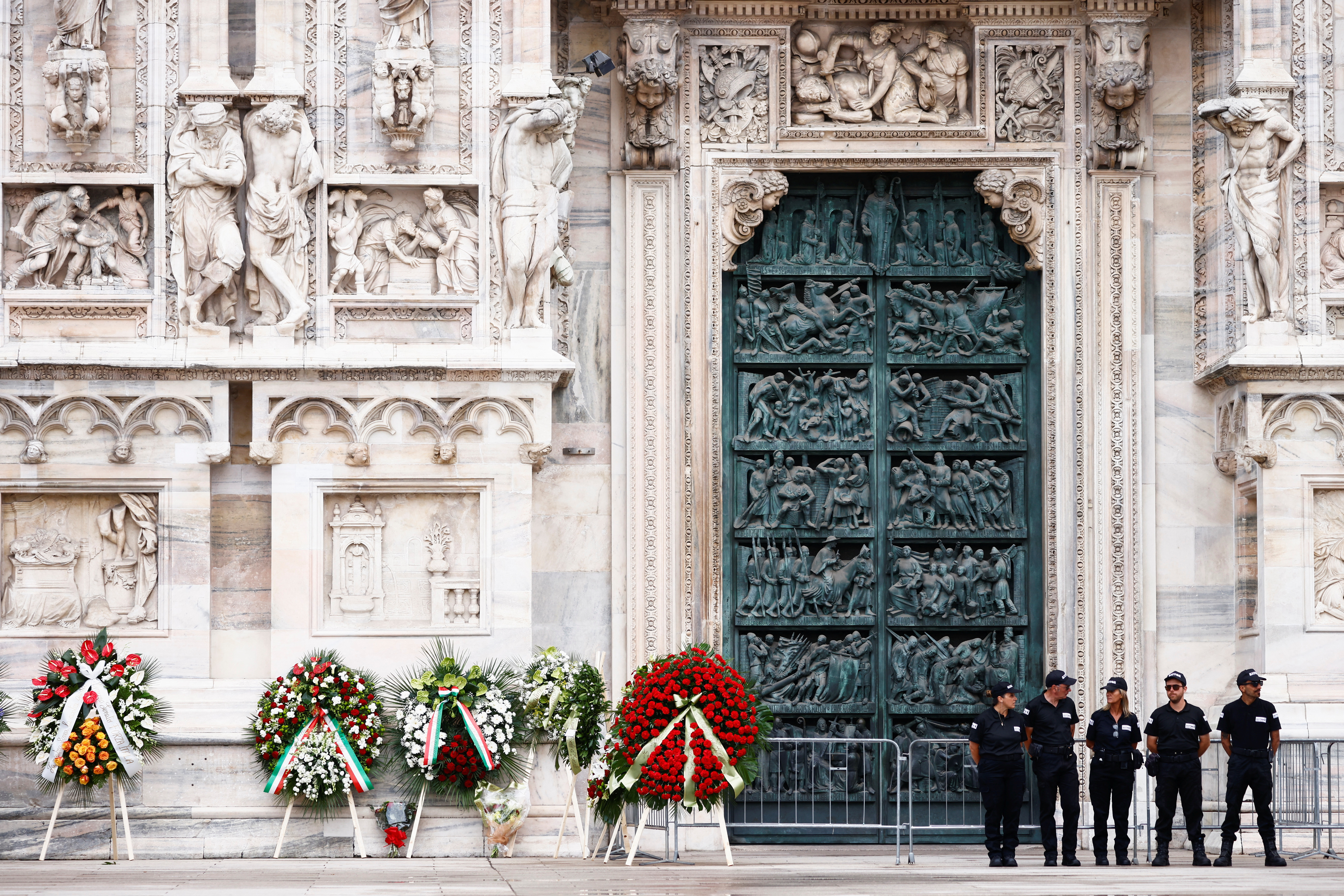
Milan, Italy – It is an official day of national mourning in Italy with flags flying half-mast to mark the death of Silvio Berlusconi, the country’s most divisive and charismatic public figure who dominated politics, business and sport for decades.
Tens of thousands of supporters of the controversial four-time prime minister gathered for a state funeral on Wednesday in Milan to pay their respects to the so-called “Knight” – a man who embodied the modern era of self-made moguls and remained a darling to many Italians despite a history of legal woes, sex scandals and international gaffes.
Berlusconi died on Monday aged 86 at the San Raffaele hospital in Milan. He had been admitted there on Friday for preplanned tests related to a chronic form of leukaemia.
His death came as a shock to many. Despite his frail health, Berlusconi’s defining presence on Italy’s political scene – coupled with his exuberance and perpetual ultra-tanned look – had almost created an illusion that he would have lived in perpetuity, as television host Bruno Vespa put it on Tuesday night.
“He has left a huge void,” said Rosanna de Angelis, a 60-year-old boutique owner in Milan’s city centre. “He made everybody feel important, he was humane,” she added.
“We will all miss him, even those who criticised him – and even cartoonists who won’t have anything to sketch now,” said Tiziana Guerra, who sells flowers close to the Duomo Gothic cathedral, a 14th-century architectural masterpiece where Berlusconi’s funeral will take place.
The church will host about 2,000 people, including Italian President Sergio Mattarella and European Union Commissioner Paolo Gentiloni. It is not clear yet which world leaders will be attending the event but state-run news agency ANSA reported that Qatari Emir Sheikh Tamim bin Hamad Al Thani and Hungarian Prime Minister Viktor Orban will be present. The funeral is due to start at 3pm local time (13:00 GMT) and will be shown live on big screens set up in the city’s main square.
Meanwhile, as newspapers and broadcasters remarked endlessly on “The end of an era”, supporters headed to Villa Arcore, Berlusconi’s luxurious mansion outside of Milan, where a small private wake attended by close family and friends took place on Tuesday. Political flags, bouquets of flowers and a large banner reading “Thank you for ever President” line the area outside the house.

‘Entering the field’
Berlusconi stormed into Italian politics in 1994 with an eight-minute video announcing the founding of a new right-wing party, Forza Italia (Go Italy). His goal was to build a new political movement on the ashes of the post-1945 First Republic which had been decimated by a wave of corruption scandals that had left Italians distrustful of the political elite.
Already a successful entrepreneur, media tycoon and owner of the successful AC Milan football team, Berlusconi sought to win the hearts of Italians by using radically different language – that was direct, modern and populist. He broke away from a decades-old tradition that wanted politicians to have a role in educating the electorate and used his allure instead to directly engage with the people. In the process, he reoriented politics away from the ideological background of the traditional parties and onto a cultural one.
“He was a charmer, a leader that would use his personal charisma rather than offering political content,” said Edoardo Novelli, a sociologist and professor of political communication at Rome Three University.
His most powerful weapon was Mediaset, a popular cable TV network that broke the information monopoly held till then by state-run media. He brought United States soap operas and shows starring female entertainers into the houses of Italians, accelerating a cultural shift that had already started in the 1980s.
“Berlusconi was an empathic man by nature and got a pulse of what Italians wanted through his commercial television,” said Lorenzo Castellani, a professor of history at Rome’s LUISS University with a focus on Italian right-wing parties. “His main capacity was to understand what the majority of Italians were caring about and most of the time it was about jobs, wealth, entertainment … And not great ideals, or political ideologies,” he added.
And it worked. In 1994, he was elected prime minister for the first time, a post he would regain in 2001, 2005 and 2008.
Testament to his endurance and appeal, Berlusconi at the time of his death was still the leader of Forza Italia and a small, yet key, coalition partner in the government of incumbent Prime Minister Giorgia Meloni.

Beloved and hated
Berlusconi’s playful touch was loved by some, but loathed by others. Never too far away from controversy, he faced accusations of corruption and of pushing through laws to protect his interests.
His humour often backfired, especially among international guests. In 2008, he came under fire for referring to then-US President Barack Obama as a “tanned guy”. The following year, he was scolded by Britain’s Queen Elizabeth at a G20 summit for speaking too loudly in public.
In 2013, two years after leaving office, Berlusconi was convicted of tax fraud and later of political corruption. He managed to narrowly avoid jail but the conviction barred him from office until 2019. He was also investigated over the infamous “Bunga Bunga” sex parties involving young and underage women.
Critics of Berlusconi saw him as someone who entered politics to protect his business interests and failed to deliver solid economic reforms as promised during electoral campaigns.
“There were only partial results in terms of fiscal cuts but nothing very structural,” said Castellani, adding that the tycoon was also impeded by his ego which prevented him from appointing a successor and creating a ruling class that might survive him.
“He also spent years to defend himself in trials, to defend the interests of his media empire while sacrificing reforms to defend himself, his political consensus and personal interests,” Castellani added.
A divisive figure in life, Berlusconi managed to trigger controversies following his death, too. The government’s announcement of a day of national mourning – an honour not granted to any other former prime minister – was met with some criticism.
“We must not forget that some of his actions had no respect for the state he represented,” said Senator Andrea Crisanti who strongly opposed national honours.
Rosy Bindi, former head of the Antimafia Commission, said it was “inopportune” for “a person as divisive as Berlusconi” and the Repubblica daily said the “institutional shutdown” was “extreme”.







